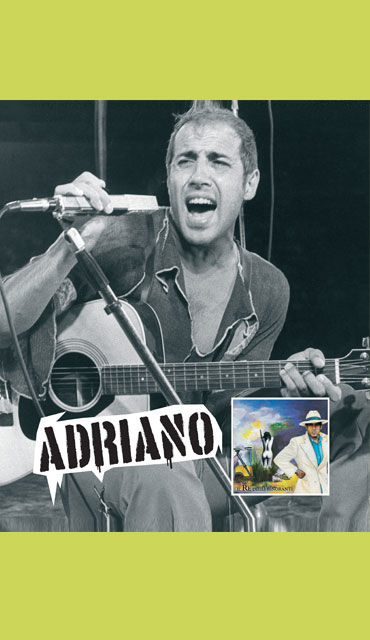Preface by Liliana Cavani
I don’t know much about Italian music.
I betrayed it a long time ago for English and American music. (Beatles, Pink Floyd, Bob Dylan, Patti Smith, etc.).
That was the music that transported me to Woodstock and into my imaginary sit-ins.
Those songs could make you feel a citizen of the world and that, since the world also belonged to you, you had to take care of it. By fighting violence, war, hypocrisy and the police.
But there was one artist in Italy who had that same effect on me. The one who sung “Il ragazzo della Via Gluck”. He didn’t belong to any group, school or trend. He was different.
He was an original and the younger generation immediately liked him.
He forwent the traditional Italian ditty and went his own way. The tone of his voice was also special with its unique sound imprint. He could have sung anything and the crowd would have still followed him.
He was a sort of enchanting storyteller with a serious sultry expression on his young face. But when he smiled he would turn into your brother and your friend. The most beautiful smile in the world. His voice and his smile haven’t changed over the years.
Actually they’re even better. That’s why he was able to do whatever he wanted – besides singing – during his Rockpolitik show. Celentano is a popular artist like the ones I listed above. These songwriters were actually the poets of our time, even if the dimwitted would consider them irrelevant just because they didn’t belong to the intelligentsia.
Also Saint Francis – the main character of two of my movies – wasn’t an intellectual but a folk poet.
Adriano’s songs nurture the best moments of the lives of the common people like me.
Those unforgettable moments, in which we feel empathy for those near us, whether we know them or not.
Adriano, by calling himself the “The King of the Ignorant” (tn: title of his song “Il Re degli Ignoranti”) points to the possibility of being a Franciscan himself since Saint Francis’ yearned for that title. He’s the non-intellectual who understood the heart of the matter because – as he says himself in one of his songs – he took a bite into “the beautiful fruit of knowledge”.
Maybe his long silences were the consequence of his eating this fruit during his Rockpolitik show, which went against the obsession of the garrulous who speak about nothing.
Silence terrifies those who appear on television, because it would entail having to think.
In Rockpolitik, Adriano would dwell on what his internal voice was telling him. He then would emerge smiling and enlightened after having found his own words so that he could express his idea without having it undermined by the “lying sputter language” (Adriano referred to television in one of his songs as a “sputabugie”)
Television is petrified of silence. Celentano isn’t. Adriano makes me thing of the TAO’s saying “you’re present if you’re invisible”. Which is something we should advise to all those experts and politicians.
Celentano pulls out a renewed energy from his daring silence and by turning his back to the audience. But it’s a form of art, the communicator’s true art, and it’s no easy feat. A higher level of empathy is necessary otherwise the audience gets irritated, hisses and sees you as a clown.
Celentano’s art form is a difficult art form. It’s almost like when yogis walk on the edge of a precipice without tripping because imagination is more real than the precipice.
Celentano knows this well and I believe his Rockpolitik show was based on the principle that nothing’s more real than the imagination. But does this concern only shows? I believe it concerns every moment of our life.
Celentano is well aware if this. He also knows that to breathe true life into a show you need an immense interior force. You can’t appear on television all the time, or often, or every other time.
Before opening your mouth you need to empty your mind, detox it and find the lost connection with “the breath of the stones with which an ancient dialogue has been interrupted”. Yogis spend a lot of time searching for beauty and wisdom inside themselves and not in TV’s theatrics and lying sputter.
It’s extremely hard to communicate about life. Celentano’s greatest invention was to share a burgeoning feeling through the TV racket. It was a risk (“what is he doing, he’s not talking. Is he making fun of us?) only someone like him could take, with his beauty of the young man who doesn’t realize he’s handsome and the grace of the shy man who is aware he is.
Only the King of the Ignorant and the Yogi who walks along a precipice can sing to the younger generation: “you seem crunchy on the outside/ like freshly baked bread/ while inside of you/ there’s the vomit of your rotting and stinky being”.


